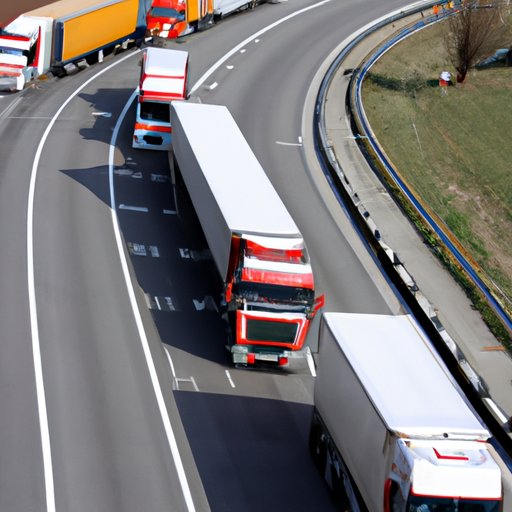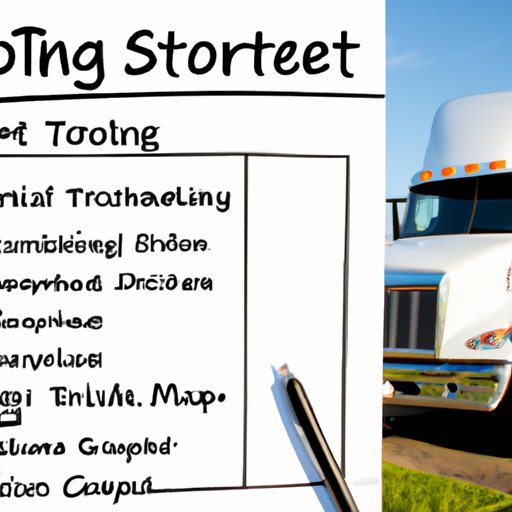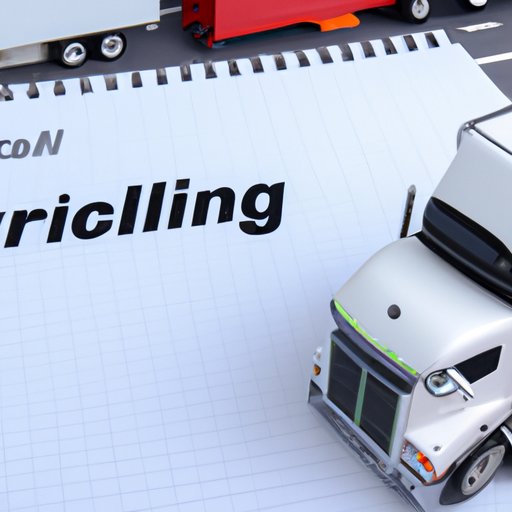Introduction
The trucking industry is essential to modern economies, as it transports goods across cities, states, and countries. Owning your own trucking business can be a rewarding venture, but there are many factors to consider. In this article, we’ll explore the advantages of owning a trucking business, outline the costs and logistics of starting one, and provide tips for success.

Overview of the Trucking Industry
According to the American Trucking Associations (ATA), “Trucks move 70.6% of all freight tonnage in the United States.” Freight transportation services account for 8.1 million jobs and generate $1.5 trillion in revenue annually. The trucking industry is also one of the most competitive, with more than 3.5 million trucks operating in the U.S. alone.
Advantages of Owning Your Own Trucking Business
There are several advantages to owning your own trucking business. For starters, you have more control over your schedule and workload, allowing you to prioritize certain tasks or take on additional jobs as needed. You’re also in charge of your own fleet and can customize it to suit your needs. Finally, owning a trucking business can be a lucrative endeavor, especially if you’re able to secure long-term contracts with reliable customers.

Outline the Costs and Logistics of Starting a Trucking Business
Before getting started, it’s important to understand the costs and logistics associated with starting a trucking business. These include initial investment costs, ongoing costs, and insurance requirements.
Initial Investment Costs
The initial cost of starting a trucking business can vary depending on the size and scope of your operations. You’ll need to purchase or lease a truck, which can cost anywhere from $50,000 to $150,000. You’ll also need to invest in fuel, maintenance, and other operational costs. According to the ATA, “Startup costs for a single truck can range from $30,000 to $100,000.”
Ongoing Costs
In addition to the initial investment costs, you’ll need to factor in the ongoing costs associated with running a trucking business. These include fuel, maintenance, insurance, licensing, and other related expenses. You’ll also need to pay yourself a salary or wages, as well as any employees you may hire.
Insurance Requirements
Another important consideration is insurance. As a trucking business owner, you’ll need to purchase liability insurance to protect yourself and your assets in the event of an accident. Depending on the type of cargo you’re hauling, you may also need to purchase additional coverage. It’s important to do your research and speak with an insurance agent to make sure you’re adequately covered.
Consider the Benefits of Being an Owner-Operator
Being an owner-operator can offer several advantages. For starters, you have more control over your schedule, allowing you to work when it’s convenient for you. You can also choose which routes you want to take and what types of loads you want to haul. Additionally, depending on your tax situation, you may be able to take advantage of certain deductions and write off some of your expenses.
Increased Flexibility
As an owner-operator, you have more freedom and flexibility when it comes to scheduling and routing. You can decide when and where you want to work, giving you more control over your time and workload. This can be especially beneficial for those who need to balance family obligations with their career.
Potential Tax Benefits
Owning a trucking business can also offer potential tax benefits. According to the Internal Revenue Service (IRS), “Owner-operators may be able to deduct certain expenses related to their business activities, including fuel, maintenance, and insurance.” It’s important to consult with a tax professional to understand how these deductions may apply to your situation.

Research Regulations and Obtain Necessary Licenses
Before you start operating your trucking business, you’ll need to obtain the necessary licenses and permits. Every state has its own regulations, so it’s important to research the laws in your area. Additionally, you’ll need to register with the Federal Motor Carrier Safety Administration (FMCSA) in order to comply with federal regulations.
Federal Motor Carrier Safety Administration (FMCSA) Requirements
The FMCSA is responsible for regulating the trucking industry and ensuring that truck drivers and businesses are compliant with safety regulations. To register with the FMCSA, you’ll need to submit an application and provide proof of insurance. You’ll also need to pass a background check and complete a series of tests before you can obtain your license.
Local and State Regulations
In addition to the FMCSA requirements, you’ll need to familiarize yourself with local and state regulations. This includes obtaining any necessary permits, such as a commercial driver’s license (CDL) and any other certifications required by your state. You may also need to register with the state’s Department of Transportation.

Find Equipment and Secure Financing
Once you’ve taken care of the legal and regulatory requirements, you’ll need to find the right equipment and secure financing. You’ll need to choose a truck that meets your needs and budget, and then explore the various financing options available.
Choosing the Right Truck
When choosing a truck, it’s important to consider size, capacity, and fuel efficiency. You’ll also want to consider the type of cargo you plan to haul, as this will determine the type of truck you need. Additionally, it’s important to research the different brands and models to ensure you’re getting the best deal.
Financing Options
There are several financing options available for those looking to purchase a truck. You can apply for a loan from a bank or credit union, or explore alternative financing options such as leasing or renting. You may also be eligible for government grants or other forms of funding.
Develop Your Network of Customers
Once you’ve secured the necessary financing, it’s time to develop your network of customers. Establishing relationships with brokers and shippers is key to success in this industry, as they can provide you with steady work. You can also use technology, such as load boards and mobile apps, to connect with customers.
Establishing Relationships with Brokers and Shippers
Brokers and shippers can provide you with steady work and help you build your reputation in the industry. When establishing relationships with them, it’s important to be honest and transparent about your capabilities and pricing. Additionally, it’s helpful to maintain good communication and respond promptly to inquiries.
Utilizing Technology to Connect with Customers
Technology has opened up new opportunities for truckers to find and connect with customers. Load boards and mobile apps allow you to search for available loads, compare rates, and book jobs quickly and easily. They can also help you stay organized and manage your business more efficiently.
Invest in Professional Training and Education
Finally, it’s important to invest in professional training and education. Taking courses and attending seminars can help you stay up to date on the latest regulations and safety protocols. Additionally, you can learn valuable skills that will help you manage and grow your business more effectively.
Understanding the Rules of the Road
It’s important to understand the rules of the road and the regulations that govern the trucking industry. Taking courses and attending seminars can help you stay informed and ensure you’re in compliance with the law. Additionally, learning about traffic patterns, weather conditions, and other variables can help you stay safe on the road.
Learning How to Manage a Fleet
For those looking to expand their operations, it’s important to learn how to manage a fleet. This includes understanding the costs associated with operating a trucking business, as well as how to properly maintain and repair trucks. Additionally, you’ll need to learn how to manage personnel and handle customer service issues.
Conclusion
Starting a trucking business can be a rewarding venture, but it’s important to understand the costs and logistics involved. The advantages of owning a trucking business include increased flexibility and potential tax benefits. Additionally, you’ll need to research the regulations and obtain the necessary licenses. When selecting equipment, it’s important to find the right truck for your needs and explore the various financing options available. Developing your network of customers is also key to success in this industry. Finally, investing in professional training and education can help you stay up to date on the latest regulations and learn valuable skills for managing and growing your business.
(Note: Is this article not meeting your expectations? Do you have knowledge or insights to share? Unlock new opportunities and expand your reach by joining our authors team. Click Registration to join us and share your expertise with our readers.)
